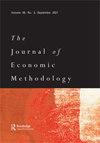允许偏好净化:行为福利经济学中的情境依赖选择和决定性福利判断
IF 1.8
3区 经济学
Q2 ECONOMICS
引用次数: 0
摘要
行为福利经济学最近受到了挑战,因为它将真正偏好的满足作为一种规范标准。该评论对文献中被认为是隐含的假设提出了质疑,即真正的偏好是与上下文无关的。这种假设不仅在行为福利经济学文献中被认为是站不住脚的,而且也是站不住脚的——人们认为,真正的偏好至少有时是与环境相关的。本文探讨了这种“内在理性主体批判”的含义。我认为,这一批判并不支持在规范经济学中大规模放弃使用真实偏好作为评估标准;相反,这一批评暗示,行为福利经济学家需要调查并确立个人决策中特定情境依赖选择的“来源”。来源决定了纠正个人情境依赖选择的许可性,并且在某些情况下,可以支持决定性的福利判断。本文章由计算机程序翻译,如有差异,请以英文原文为准。
Permissible preference purification: on context-dependent choices and decisive welfare judgements in behavioural welfare economics
Behavioural welfare economics has lately been challenged on account of its use of the satisfaction of true preferences as a normative criterion. The critique contests what is taken to be an implicit assumption in the literature, namely that true preferences are context-independent. This assumption is considered not only unjustified in the behavioural welfare economics literature but unjustifiable – true preferences are argued to be, at least sometimes, context-dependent. This article explores the implications of this ‘critique of the inner rational agent’. I argue that the critique does not support a wholesale shift away from the use of true preferences as an evaluative standard in normative economics; instead, the critique implies that behavioural welfare economists need to inquire into and establish the ‘source’ of particular context-dependent choices in individuals’ decision-making. The source determines the permissibility of correcting individuals’ context-dependent choices and can, in some situations, support decisive welfare judgements.
求助全文
通过发布文献求助,成功后即可免费获取论文全文。
去求助
来源期刊

Journal of Economic Methodology
ECONOMICS-
CiteScore
3.20
自引率
8.30%
发文量
23
期刊介绍:
The Journal of Economic Methodology is a valuable forum which publishes the most current and exciting work in the broad field of economic methodology. The Journal of Economic Methodology addresses issues such as: ■Methodological analysis of the theory and practice of contemporary economics ■Analysis of the methodological implications of new developments in economic theory and practice ■The methodological writings and practice of earlier economic theorists (mainstream or heterodox) ■Research in the philosophical foundations of economics ■Studies in the rhetoric, sociology, or economics of economics
 求助内容:
求助内容: 应助结果提醒方式:
应助结果提醒方式:


